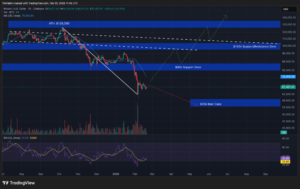Last updated:
 Why Trust Cryptonews
Why Trust Cryptonews

U.S. spot Bitcoin exchange-traded funds (ETFs) have surpassed $100 billion in total net assets as Bitcoin continues its record-breaking surge.
Data from SoSoValue shows that as of Wednesday, the 12 spot Bitcoin ETFs collectively held $100.55 billion, accounting for approximately 5.4% of Bitcoin’s total market capitalization.
BlackRock’s IBIT leads the pack with $45.4 billion in assets, followed by Grayscale’s GBTC with $20.6 billion.
Bitcoin Hits New ATH
Bitcoin itself reached an all-time high, trading around $97,094, a 3.8% increase over the past 24 hours.
The funds also experienced significant inflows, with $733.5 million recorded on Wednesday and $837.36 million the day before.
BlackRock’s IBIT saw the highest inflows, receiving $626.5 million, while Fidelity’s FBTC attracted $133.9 million.
Smaller contributions included $9.3 million for Bitwise’s BITB and $3.8 million for Ark and 21Shares’ ARKB. However, Grayscale’s GBTC reported no new inflows.
Trading activity for bitcoin ETFs reached $5.09 billion on Wednesday, down slightly from Tuesday’s $5.71 billion.
Meanwhile, spot Ethereum ETFs in the U.S. continue to see outflows, with $30.3 million withdrawn on Wednesday, marking the fifth consecutive day of negative flows.
Trading volume for ether ETFs dropped to $338.3 million, compared to $345.1 million the previous day.
“The main driver behind BTC’s rapid rise is still institutional involvement. We have seen large net inflows into BTC ETFs this week. By Wednesday this week, BTC ETFs had achieved a net inflow of $1.8 billion,” Gracy Chen, CEO at Bitget, said in a statment.
Chen noted that MicroStrategy purchased 51,000 BTC last week at a cost of $88,617 each, and this week, they announced plans to raise $2.6 billion to continue purchasing BTC.
“Well-known mining companies are planning to issue $850 million in convertible bonds to buy BTC. The massive spot buying power of traditional funds has caused BTC’s price to rise quickly.”
Meanwhile, the open interest in BTC contracts has surged to $63 billion, with a daily increase of $6 billion.
BTC’s implied volatility (IV) has risen to 60, indicating a higher probability of large market fluctuations in the future.
Chen said that short-term capital has a tendency to lock in profits, which could lead to large price swings around the $100K mark.
Bitwise Asset Management Takes Step Towards Solana ETF
Bitwise Asset Management has filed to establish a trust entity for its proposed Bitwise Solana ETF in Delaware, marking an early step toward launching the fund as the crypto ETF market continues to see increased demand.
If approved, Bitwise will join other asset managers like VanEck and 21Shares, which have also pursued Solana-focused ETFs.
The filing follows Bitwise’s recent S-1 registration for an XRP ETF, the first fund proposal offering exposure to Ripple’s native cryptocurrency.
The firm has experienced remarkable growth in 2024, with assets under management (AUM) reaching $5 billion as of October 15—a 400% year-to-date surge.
Bitwise’s spot Bitcoin ETF, BITB, has also gained significant traction, drawing $2.3 billion in net inflows since its launch, second only to offerings by BlackRock and Fidelity.


















